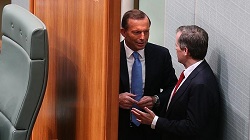Contrasting views were put yesterday on the issue as to whether parliament should decide on our involvement in the Iraq conflict. Tony Abbott put the status quo thus:
The National Security Committee of the Cabinet considers the matter, the full Cabinet considers he matter, a decision is taken, the Opposition leader is consulted.
That’s the standard procedure. It’s always been thus; as far as I’m concerned it always will be thus.
I understand that Abbott made a statement to parliament in the afternoon advising members of developments and the action taken and contemplated. Abbott ruled out giving Parliament a vote on the current airlift to Iraq and any subsequent involvement.
In this he was backed by Labor. Stephen Conroy:
Labor fully supports the role of Parliament as a place of debate, but that should not be confused with requiring parliamentary approval. The role of the Parliament in approving military action is fraught with danger. The Government must retain maximum flexibility to respond to threats to Australia’s national security quickly and efficiently.
The Liberal Democrats think there should be a two-thirds vote in both houses of Parliament to commit forces overseas in foreign conflicts.
The Greens are leading the charge for the parliament to have a vote. Christine Milne:
The Australian Parliament now needs to be consulted and approval needs to be sought from the representatives of the people.
And:
Greens leader Christine Milne says there’s been no United Nations resolution for intervening in northern Iraq, nor, she says, has anyone seen an Iraqi government request.
Andrew Wilkie is very much of the same view. He questions whether we are becoming gun-runners for the Kurds at the direction of the United States.
Wilkie says it’s time Australia followed the lead of a long list of “sophisticated, developed democracies”:
Countries as diverse as Denmark, Finland, France, Germany, Ireland, Italy, Luxemburg, the Netherlands, Spain, Sweden, the United States, and by convention, now even the United Kingdom – all of these countries require parliamentary involvement in decision-making about matters of war and peace.
Flexibilty and speed of decision making can save lives. However, there is concern about mission creep. Also Laura Tingle tells us that modern prime ministers have assumed the right to make a decision irrespective of cabinet’s views. Laura Tingle says:
The trend towards all powerful prime ministers – or to that perception – has been a persistent one in the past 30 years.
There were some ding dong battles in the Howard cabinet: on the early round of industrial relations reforms in 1996, for example, on the GST; on the car industry.
But as the government aged, and the absolute authority of the prime minister grew, the idea of cabinet government started to recede.
It wasn’t that cabinet didn’t meet and debate, it was just that ministers would increasingly be inclined to just shrug their shoulders and gesticulate at the PM’s office down the corridor to explain what was driving the direction of a particular policy.
The same was apparently true under Rudd and Gillard. But under Hawke in the mid-1980s things were different:
A reminder of what has been lost comes leaping out at us from Gareth Evans’s Inside the Hawke Keating Government: A Cabinet Diary, released this week.
It says much that a diary written 30 years ago can still sparkle and shimmy with a vibrancy that puts most recent political tomes to shame.
The striking thing about the book she says is “the sense of both collective responsibility and authority felt by the colourful cabinet ministers who brawl and wrestle their way through complex issues in the pages of Evans’s diary, covering the period 1984-86.”
How the Abbott cabinet works is not known to me. We have heard of Peta Credlin as head of PMO tearing strips off ministers.
Mark Latham argues for a Bastardry Factor as essential in a leader. Apparently Bill Shorten doesn’t have it. Thank God for that!
On the present issue I have the sense that Abbott has been genuinely consultative, and on balance I’d leave the protocols as they are. That’s unless there are to be boots on the ground. Then the Liberal Democrats’ notion of a two-thirds majority in both houses looks good to me.

